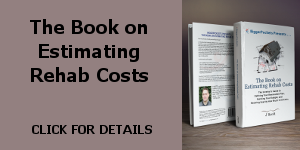The fiancee and I headed to Atlanta a few weeks ago on our first house-hunting trip. In preparation, I decided to look into finding a real estate agent to help us better get our bearings on the local area where we are considering buying, as well as to help us negotiate and close once we find a house we like.
Doing some agent research, I came across the term “buyer’s agent.” Remember, I’ve never bought a piece of real estate in my life, so while this concept might be well known to many people, it wasn’t to me. And in case there are others out there who don’t know what a buyer’s agent is (or why they’re valuable), let me explain…
In a typical real estate transaction, there is generally at least one — and often two — real estate agents involved. There is the agent that represents the seller (the listing agent); this is the person who lists the house on the MLS, markets it, shows it to potential buyers, etc. And there is often an agent that helps the buyer; this is the person who pulls listings from the MLS, takes the buyer around to various houses, and — in theory — represents the buyer’s interest when it comes to negotiating and making a deal. Unfortunately, that’s not always the way it works in the real world.
While the listing agent is certainly obligated to represent the seller, the buyer’s agent isn’t necessarily obligated to represent the buyer. Depending on the type of agent, who he works for, the laws of the state, and relationship between the buyers and agent, the agent helping the buyer may actually be representing the seller of the property instead of the buyer. In fact, in many cases, the agent helping the buyer is legally obligated to help the seller get the best price for the house, even if it means getting a worse deal for the buyer he is “representing.” For example, the agent helping the buyer may be legally obligated to tell the seller information about the buyer (for example, telling the seller the highest price the buyer is willing to pay), while at the same time be legally obligated to keep seller information confidential (for example, not telling his buyer how low the seller is willing to go, even if the agent is in possession of that information).
Wow, this was news to me!
So, how do you avoid working with an agent who may not represent your interests or who may have a conflict of interest? You use a “buyer’s agent.”
A buyer’s agent is a real estate agent who contractually represents the buyer, providing the following benefits:
- The buyer’s agent has a legal and fiduciary responsibility to the buyer to ensure he gets the best deal possible;
- The buyer’s agent has a legal responsibility to keep all information the buyer provides confidential ;
- The buyer’s agent has no responsibility to keep the seller’s information confidential;
- The buyer’s agent has a responsibility to not enter into a conflict of interest (for example, the buyer’s agent can’t show you properties that his agency has listed).
So, what are the downsides of a buyer’s agent, you may ask? Based on my research, I’ve only come across two, both of which can be mitigated if handled appropriately:
- The buyer’s agent works on commission (for example, perhaps 3% of the sale price of the property). Generally, this commission is paid by the seller as part of the sale contract (just like any other agent who represents the buyer would receive). But, if the seller isn’t willing to pay the full commission that the buyer’s agent is owed (for example, if the seller is only willing to pay 2.5%), the buyer may have to make up the difference out-of-pocket. If you’re working with a buyer’s agent, make sure you discuss contingencies for if something like this should happen;
- Some buyer’s agents will attempt to get you to enter an exclusive contract. This means that for the duration of the contract, the buyer is legally responsible to pay the buyer’s agent his commission regardless of whether that agent helped the buyer find the property that is being purchased. Worst case, the buyer gets shown the property by another agent, and now both agents expect to get paid. To mitigate this situation, never enter into an exclusive deal with a buyer’s agent. Instead, enter into non-exclusive deals where the buyer’s agent is only obligated to get paid if you purchase a property that he has shown you.
As for us, it was an easy decision to use a buyer’s agent for our first house purchase, and luckily, based on a recommendation from a close friend in Atlanta, we found someone who seems perfect to work with us…




While in principle, I agree with you – I must disagree with the aversion from Exclusive Buyer Agency.
Most seasoned and experienced agents will not agree to a non-exclusive arrangement – thus your advice will leave the buyer with a less-experienced agent who will agree to such an arrangement. And if the agent will put themselves in such a bad agreement – just think of what kind of an agreement that they’ll put a buyer into.
Most states have provisions in their contracts that allow the buyer to terminate the agreement, should the buyer desire to do so.
Thanks for the feedback, Doug!
Can you explain why you think a non-exclusive arrangement is so bad for agents? It doesn’t seem unreasonable that a buyer would want to use multiple avenues to find a house (agent, FSBO, Internet, friends/family, etc), and by entering into an exclusive agreement with a buyer’s agent, the buyer is automatically potentially cutting off certain channels to find properties.
I certainly agree that buyer’s should act in good faith towards the agent (not try to cut him out of commission if he does good work), but even when acting in good faith, sometimes buyers will find properties in ways other than through their agent.